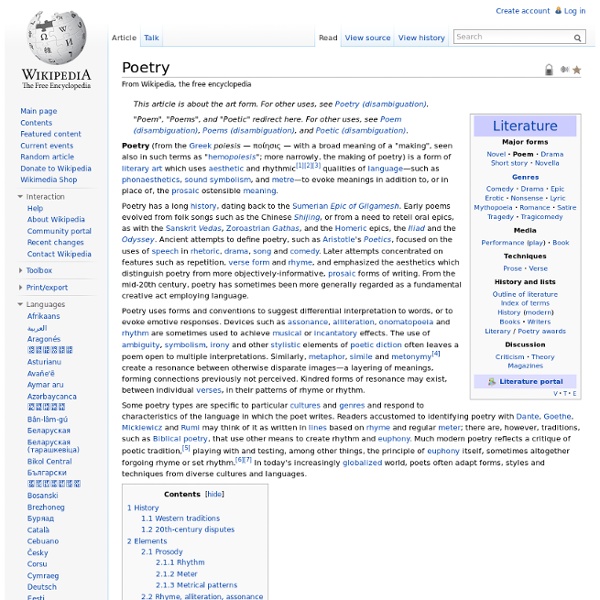



Scotland Give me but one hour of Scotland, Let me see it ere I die. Scotland is a country forming the northernmost third of Great Britain. An independent kingdom until 1707, it is now a constituent part of United Kingdom with limited powers of self-government. Quotes[edit] O Scotia! Hoyt's New Cyclopedia Of Practical Quotations[edit] Quotes reported in Hoyt's New Cyclopedia Of Practical Quotations (1922), p. 692-93. Give me but one hour of Scotland, Let me see it ere I die. External links[edit] Wikivoyage has a travel guide for:
John Keats John Keats, who died at the age of twenty-five, had perhaps the most remarkable career of any English poet. He published only fifty-four poems, in three slim volumes and a few magazines. But at each point in his development he took on the challenges of a wide range of poetic forms from the sonnet, to the Spenserian romance, to the Miltonic epic, defining anew their possibilities with his own distinctive fusion of earnest energy, control of conflicting perspectives and forces, poetic self-consciousness, and, occasionally, dry ironic wit. In his own lifetime John Keats would not have been associated with other major Romantic poets, and he himself was often uneasy among them. Keats was born in London on 31 October 1795, the eldest of Thomas and Frances Jennings Keats's four children. At the age of eight Keats entered Enfield Academy and became friends with young Charles Cowden Clarke, the fifteen-year-old son of the headmaster. This was a turning point.
Robin Nicholson on Landscape, Emigration and the Scottish Artist, 1849-1895 1. Captain Birt, a surveyor in the British Army, quoted in Peter Bicknell, ed., Beauty, Horror and Immensity: Picturesque Landscape in Britain, 1750–1850 (Cambridge: Cambridge University Press, 1981), ix. 2. Edmund Burke, A Philosophical Inquiry into the Origins of the Sublime and the Beautiful (London: R & J Dodsley, 1757), 86. 3. 4. 5. 6. 7. 8. 9. 10. 11. 12. 13. 14. 15. 16. 17. 18. 19. 20. 21. 22. 23. 24. 25. 27. 28. 29. 30. 31. 32. 33. 34. 35. 36. 37. 39. 40. 41. 42. 43. 44. 45. 46. 47. 48. 49. 50. 51. 52. 53. 54. 55. 56. 57. 58. 59. November | 2012 | Eighteenth-Century Media The Citadelpark, Ghent’s most well-known public garden, is a perfect combination of ‘natural’ and cultural elements. On a stroll through, you can find statues, Roman-inspired buildings, columns, and a kiosk, but also waterfalls, a lake, trees, ancient ruins and a grotto. The latter may seem natural, but are in fact carefully designed, artificially made, with a watchful eye for detail and variety. The park is a great nineteenth century example of the popular English garden that has its origins in the eighteenth century. Citadelpark, Ghent (youropi.com) The eighteenth-century garden At that time, Great Britain was already one of the world’s most influential powers. The first to successfully mix the Roman style with the contemporary tastes was Andrea Palladio, an Italian architect. Villa Foscari La Malcontenta, design by Andrea Palladio (wikipedia.org) Stowe Garden, Vista (merve-references.blogspot.be) Stowe Garden, Palladian Bridge (merve-references.blogspot.be) Pope’s opinion on gardening
Expressions & Sayings Index If you prefer to go directly to the meaning and origin of a specific expression, click on its relevant entry in the alphabetical list below. Use this alphabet to speed up your search: A B C D E F G H I J K L M N O P Q R S T U V W X Y Z A SCOTS QUAIR Title: A Scots Quair Author: Lewis Grassic Gibbon * A Project Gutenberg of Australia eBook * eBook No.: 0700471h.html Language: English Date first posted: April 2007 Date most recently updated: April 2007 This eBook was produced by: Don Lainson dlainson@sympatico.ca Project Gutenberg of Australia eBooks are created from printed editions which are in the public domain in Australia, unless a copyright notice is included. We do NOT keep any eBooks in compliance with a particular paper edition. Copyright laws are changing all over the world. Be sure to check the copyright laws for your country before downloading or redistributing this file. This eBook is made available at no cost and with almost no restrictions whatsoever. You may copy it, give it away or re-use it under the terms of the Project Gutenberg of Australia License which may be viewed online at GO TO Project Gutenberg of Australia HOME PAGE by Sunset Song first published 1932 Prelude The Song
Gerald Massey on Shakespeare's Sonnets (14). THIS is the tri-centennial year in which we celebrate the famous defeat of the Invincible Spanish Armada; and in proudly glancing back to the period when our little country lived thus greatly, we shall find few pictures so attractive in the long gallery of the past as that of England in the time of "Good Queen Bess," the "Gloriana" of Spenser's Faery Queen; she who moves amongst the fine spirits of her day all smilingly surrounded with the strength of a mighty people, that lift her up, in their love and worship, a whole heaven above them. But it is not Queen Bess who is the most important personage of her era in our eyes to-day. In that Elizabethan group of glory there is one bright particular star which shines out large and luminous above the rest. We know that somewhere at the centre lives the spirit of all the brightness, however lost in light. Still one cannot agree with Goethe's declaration that everything said of Shakspeare is inadequate.